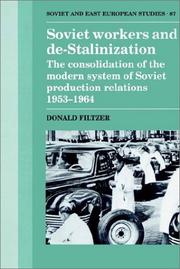| Listing 1 - 2 of 2 |
Sort by
|

ISBN: 0521418992 0521522412 0511628706 051188110X Year: 1992 Volume: 87 Publisher: Cambridge New York, NY, USA Cambridge University Press
Abstract | Keywords | Export | Availability | Bookmark
 Loading...
Loading...Choose an application
- Reference Manager
- EndNote
- RefWorks (Direct export to RefWorks)
This 1992 book is a comprehensive study of the position of Soviet industrial workers during the Khrushchev period. Dr Filtzer examines the main features of labour policy, shop-floor relations between workers and managers, and the position of women workers. He argues that the main concern of labour policy was to remotivate an industrial population left demoralized by the Stalinist terror. This 'de-Stalinization' had to be carried out without undermining the power and property relations on which the Stalinist system had been built. The author convincingly demonstrates how labour policy was thus limited to superficial gestures of liberalization and tinkering with incentive schemes. Rather than achieving any lasting effects, the Khrushchev period saw the consolidation of a long-term decline into economic stagnation. The labour problems under Khrushchev are shown to be the same as those which confronted Mikhail Gorbachev and his ill-fated perestroika, thus helping to explain the failures of Gorbachev's policies.
Industrial relations --- Working class --- Relations industrielles --- Travailleurs --- History --- Histoire --- Soviet Union --- URSS --- Economic conditions --- Conditions économiques --- Conditions économiques --- 20th century --- 1955-1965 --- Working class - Soviet Union - History - 20th century. --- Industrial relations - Soviet Union - History - 20th century. --- Soviet Union - Economic conditions - 1955-1965. --- Arts and Humanities --- Commons (Social order) --- Labor and laboring classes --- Laboring class --- Labouring class --- Working classes --- Social classes --- Labor --- Capital and labor --- Employee-employer relations --- Employer-employee relations --- Labor and capital --- Labor-management relations --- Labor relations --- Employees --- Management --- Employment

ISBN: 0521392411 0521121302 0511559291 0511877900 Year: 1993 Volume: 88 Publisher: Cambridge New York, NY, USA Cambridge University Press
Abstract | Keywords | Export | Availability | Bookmark
 Loading...
Loading...Choose an application
- Reference Manager
- EndNote
- RefWorks (Direct export to RefWorks)
In this 1992 book Professor Peter Rutland analyses the role played by regional and local organs of the Soviet Communist Party in economic management from 1970 to 1990. Using a range of political and economic journals, newspapers and academic publications, he examines interventions in the construction industry, energy, transport, consumer goods and agriculture. Rutland argues that party interventions hindered rather than assisted the search for efficiency in the Soviet economy, and repeated attempts to introduce more economically rational management methods failed to alter these traditional patterns of party intervention. He further demonstrates how as the Soviet economy matured and grew more complex over the last three decades, party interventions became increasingly out of tune with the needs of the economy. Yet even the calls for radical reform of the economy since 1985 were not accompanied by any decisive changes in this pattern of party intervention; this, argues Peter Rutland, casts serious doubts on the political feasibility of economic reform in a Soviet-type system.
Industrial management --- Gestion d'entreprise --- Kommunisticheskaia partiia Sovetskogo Soiuza --- Soviet Union --- URSS --- Economic policy --- Politics and government --- Politique économique --- Politique et gouvernement --- Kommunisticheskai͡a partii͡a Sovetskogo Soi͡uza --- Politique économique --- Working class --- History --- 20th century --- Industrial relations --- Economic conditions --- 1955-1965 --- Working class - Soviet Union - History - 20th century. --- Industrial relations - Soviet Union - History - 20th century. --- Soviet Union - Economic conditions - 1955-1965. --- Social Sciences --- Political Science --- Kommunisticheskai︠a︡ partii︠a︡ Sovetskogo Soi︠u︡za. --- Communist Party of the Soviet Union --- Communist Party of USSR --- CPSU --- Đảng cộng sản Liên xô --- Kamunistychnai︠a︡ partyi︠a︡ Savetskaha Sai︠u︡za --- KKSE --- Kommounistikon Komma tēs Sobietikēs Henōseōs --- Kommunistische Partei der Sowjet Union --- Komunistička partija Sovjetskog Saveza --- Komunistická strana Sovětského svazu --- Komunistychna partii︠a︡ Radi︠a︡nsʹkoho Soi︠u︡zu --- Komunistyczna Partia Związku Radzieckiego --- KPdSU --- KPR --- KPRS --- KPSS --- KPZR --- KSSS --- KSSZ --- Miflagah ha-ḳomunisṭit shel Berit-ha-Moʻatsot --- Neuvostoliiton kommunistinen puolue --- NKP --- NLKP --- Nõukogude Liidu Kommunistlik Partei --- Partai Komunis Uni Sovjet --- Parti communiste de l'Union soviétique --- Partido Comunista de la Unión Soviética --- Partido Comunista Ruso --- Partito comunista Unione sovietica --- PCUS --- Phō̜kō̜sō̜sō̜ --- PKUS --- Rokoku Kyōsantō --- Roshia Kyōsantō --- Rosia Kongsandang --- Sabčotʻa Kavširis Komunisturi Partia --- SKKP --- SMKK --- SMKP --- Sobieto Kyōsantō --- Soren Kyōsantō --- Sorenpō Kyōsantō --- Sov. IKP --- Sovet Ittifagy Kommunist Partii̐asy --- Sovetakan Miutʻian Komunistakan Kusaktsʻutʻyun --- Sovetakan Miutʻian Komunistakan Partia --- Soviet Communist Party --- Soviet Union. --- Sōviyata Saṅghakī Kamyunisṭa Pārṭī --- Sovjetunionens kommunistiska parti --- Sovyetler Birliği Komünist Partisi --- Su-lien kung chʻan tang --- SUKP --- SZKP --- Szovjetunió Kommunista Pártja --- U̇mum Ittifag Kommunist Partii︠a︡sy --- Zenrenpō Kyōsantō --- ZKhUKN --- Zȯvlȯlt Kholboot Ulsyn Kommunist Nam --- Коммунистическая партия Советского Союза --- אלקפ (ב) --- מפלגה הקומוניסטית של ברית־המועצות --- 蘇聯共產黨 --- Kommunisticheskai︠a︡ partii︠a︡ Rossiĭskoĭ Federat︠s︡ii --- Kommunisticheskai︠a︡ partii︠a︡ RSFSR --- Vsesoi︠u︡znai︠a︡ kommunisticheskai︠a︡ partii︠a︡ (bolʹshevikov) (1925-1952) --- Vsesoi︠u︡znai︠a︡ kommunisticheskai︠a︡ partii︠a︡ (bolʹshevikov) (1991- )
| Listing 1 - 2 of 2 |
Sort by
|

 Search
Search Feedback
Feedback About UniCat
About UniCat  Help
Help News
News